Search titles
Displaying results 1 to 10 of 153.
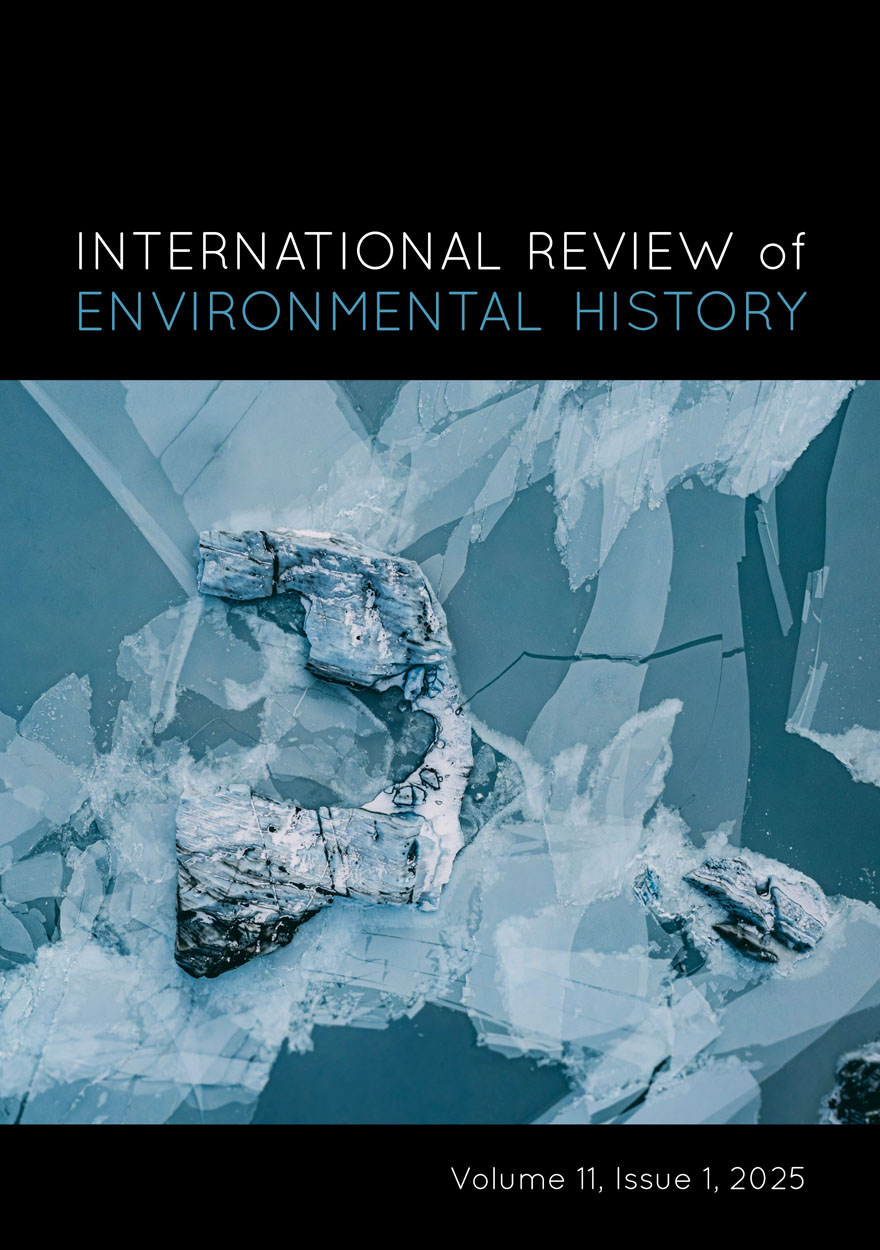
International Review of Environmental History: Volume 11, Issue 1, 2025 »
Edited by: James Beattie, Ruth Morgan
Publication date: November 2025
This latest issue of the International Review of Environmental History takes readers from the settler landscapes of nineteenth-century Aotearoa New Zealand to the post-1945 rise of herbicides in Northern Europe. Lingering in Aotearoa, readers will be immersed in geological debates about the causes of past glaciation and trace the early twentieth-century appeal of the Phoenix palm. This issue also features a personal reflection on the campaign to protect K’gari-Fraser Island in the mid-1970s and its lasting influence on Australian environmental law. Together, these contributions reveal the spread and influence of transnational ideas on local understandings of environmental change and conservation.

Ink and Land »
Documenting Factionalism around a Prospective Mine in Papua New Guinea
Authored by: Willem Church
Publication date: August 2025
Ink and Land is an ethnographic account of political and legal struggles over landownership in Papua New Guinea, in which competing factions seek recognition as customary landowners of Wafi-Golpu, a major prospective copper-gold mine. Drawing on extensive archival research, oral histories, court documents and fifteen months of fieldwork, the book examines how different groups attempt to harness resource extraction for their benefit and how, in doing so, they reshape their social worlds through the medium of affidavits, court declarations and incorporation certificates. To analyse this process, the book advances the concept of antagonistic documentality—a form of conflict in which parties engage in conflicting world-building projects through and about documents and, in doing so, create an order of paper that outlasts the disputes themselves. Through this detailed case study, Ink and Land reveals how legal and bureaucratic battles over resource extraction in Papua New Guinea formalise factionalism, consolidate elite control over new sources of wealth, and redefine the nature of groups and landownership. By focusing on conflict over documents as a process of social transformation, the book offers fresh insights into the politics of land, law and resource extraction in the contemporary Pacific.

International Review of Environmental History: Volume 10, Issue 1, 2024 »
Edited by: James Beattie, Ruth Morgan
Publication date: October 2024
This latest issue of the International Review of Environmental History takes readers from tiger hunts in sixteenth-century India to the rise of organic foods across the Anglosphere by the late 1970s. Along the way, readers will encounter the ways that Cantonese migrants interpreted the environments of Aotearoa New Zealand at the turn of the twentieth century, and the influence of environmentalism in the US trade union movement during the 1960s. This issue also features a forum on a growing area of interest for environmental historians and allied practitioners, the history of emotions in response to environmental change. Here, scholars outline an historiography of ecological anxiety and reflect on the role of emotions in their historical practice at a time of planetary crisis. Despite the diverse settings and topics of the papers herein, together the collection reveals the enduring impacts of how different societies have understood and shaped the more-than-human world.
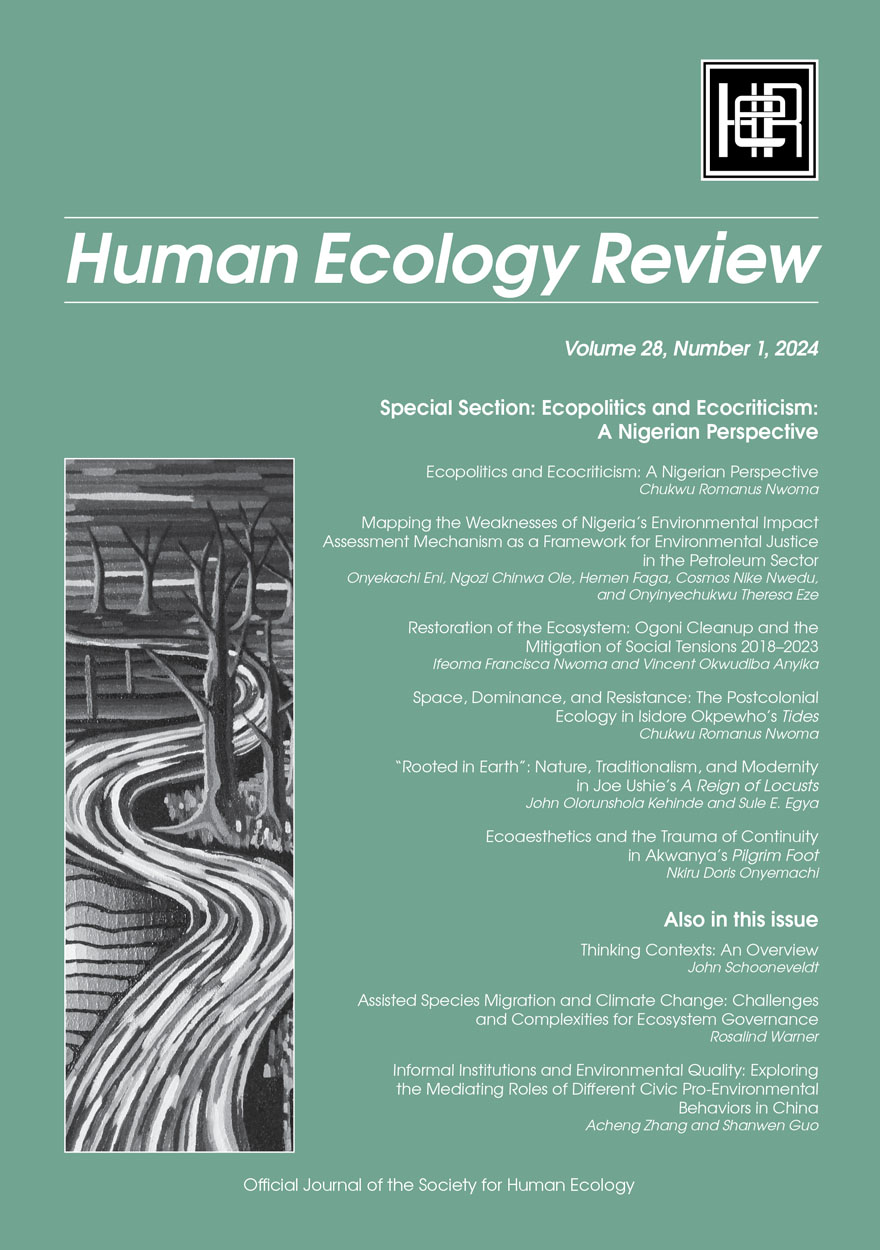
Human Ecology Review: Volume 28, Number 1 »
Publication date: September 2024
Human Ecology Review 28(1) features a Special Section from a collection of researchers in Nigeria, reflecting on the political and cultural influences on, and responses to, the unique social and environmental devastation of the oil-producing Niger Delta region. Across five articles and the introductory piece, the scholars address social and environmental justice and policy (Eni et al.); and examine the attempts to restore and clean up the landscape (I. Nwoma and Anyika). The focus then turns to ecoaesthetic responses in literary forms to the Nigerian landscape and cultures, with an ecocritical analysis of postcolonial ecology in Isidore Okpewho’s novel Tides (C. Nwoma); of traditionalism, modernity, and nature in Joe Ushie’s collection of poems, A Reign of Locusts (Kehinde and Egya); and concludes with an examination of the trauma of alienation from nature and homeland in Amaechi Akwanya’s collection of poems Pilgrim Foot (Onyemachi).
Following the Special Section, Schooneveldt describes a methodology for reframing how we perceive the agency of other organisms; Warner refines and develops governance principles for assisted species migration; and Zhang and Guo explore informal institutions in China and their role in mediating pro-environmental behaviours.
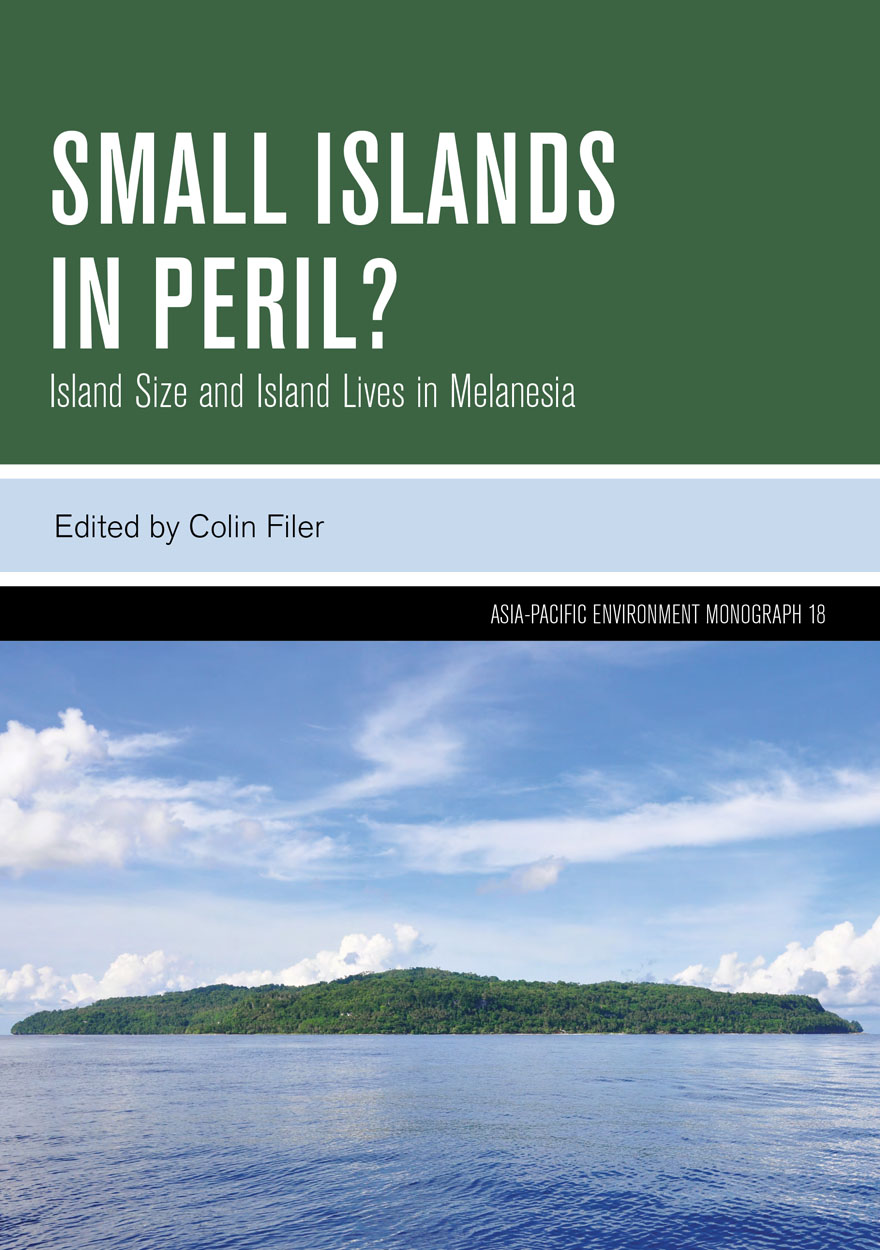
Small Islands in Peril? »
Island Size and Island Lives in Melanesia
Edited by: Colin Filer
Publication date: July 2024
This book explores the idea that small island communities could be regarded as canaries in the coal mine of sustainable development because of scientific and anecdotal evidence of a common link between rapid population growth, degradation of the local resource base, and intensification of disputes over the ownership and use of terrestrial and marine resources. The authors are all anthropologists with a specific interest in the question of whether the economic and social ‘safety valves’ that have previously served to break some of the feedback loops between these trends appear to be losing their efficacy. While much of the debate about economy–society–environment relationships on small islands has been overtaken by a narrow focus on the problem of climate change, the authors show that there are many other factors at work in the transformation of island lives and livelihoods.

Salish Archipelago »
Environment and Society in the Islands Within and Adjacent to the Salish Sea
Edited by: Moshe Rapaport
Publication date: June 2024
The Salish Archipelago includes more than 400 islands in the Salish Sea, an amalgamation of Canada’s Georgia Strait, the United States’ Puget Sound, and the shared Strait of Juan de Fuca. The Salish Sea and Islands are named for the Coast Salish Indigenous Peoples whose homelands extend across the region.
Holiday homes and services have in many places displaced pristine ecosystems, Indigenous communities, and historic farms. Will age-old island environments and communities withstand the forces of commodity-driven economies? This new, major scholarly undertaking provides the geographical and historical background for exploring such questions.
Salish Archipelago features sections on environment, history, society, and management, accompanied by numerous maps and other illustrations. This diverse collection offers an overview of an embattled, but resilient, region, providing knowledge and perspectives of interest to residents, educators, and policy makers.
Format: Hardback

International Review of Environmental History: Volume 9, Issue 2, 2023 »
Edited by: James Beattie
Publication date: February 2024
The histories and legacies of extraction and toxicity are innumerable. Globally, these forces have both facilitated and been a by-product of industrial growth, technological advancement and nation-building for centuries, but so too have they enabled and exacerbated environmental degradation, structural inequality, and the continued colonisation of lands and peoples. In addressing the histories and legacies of extraction and toxicity, this special issue of the International Review of Environmental History draws attention to several of the most pressing themes taken up by historians dealing with these processes. The papers within explore how extraction and toxicity have been woven into the colonial fabric of various countries, the ways that the exploitation and contamination of specific landscapes have come to define the history of such places and spaces, the response of various groups to these processes, and the extent to which long-term environmental consequences wrought by extractive practices and their toxic by-products are—in many cases—yet to be revealed. The articles in this special issue span Australia, Africa, the Pacific, and the Southern Ocean, consider the 19th, 20th, and 21st centuries, and draw on a range of disciplinary methods and perspectives. What binds them together is a deep engagement with the significant legacies of extraction and toxicity that endure into the present and inform contemporary environmental debates.
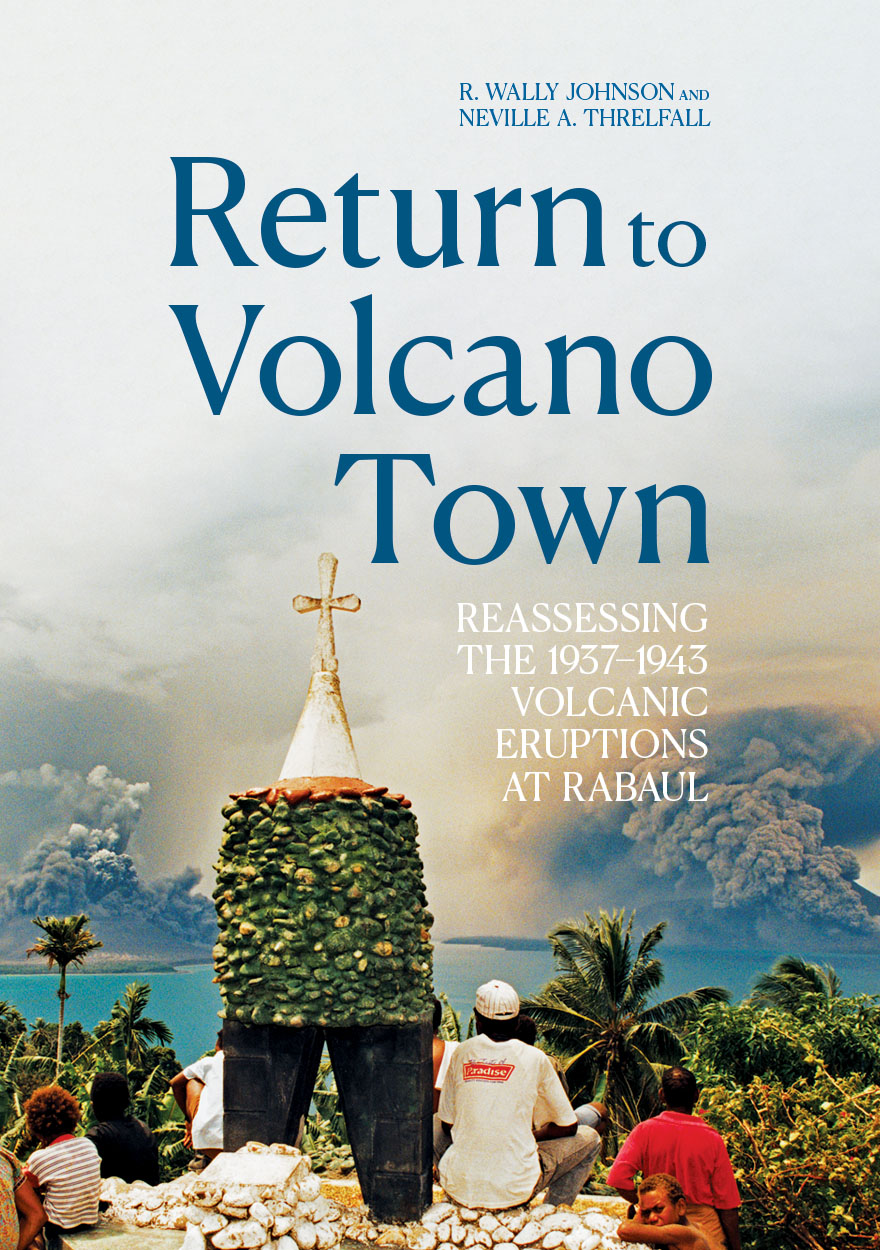
Return to Volcano Town »
Reassessing the 1937–1943 Volcanic Eruptions at Rabaul
Authored by: R. Wally Johnson, Neville A. Threlfall
Publication date: October 2023
Wally Johnson and Neville Threlfall re-examine the explosive volcanic eruptions that in 1937–43 killed more than 500 people in the Rabaul area of East New Britain, Papua New Guinea. They reassess this disaster in light of the prodigious amount of new scientific and disaster-management work that has been undertaken there since about 1971, when strong tectonic earthquakes shook the area. Comparisons are made in particular with volcanic eruptions in 1994–2014, when half of Rabaul town was destroyed and then abandoned.
A striking feature of historical eruptive periods at Rabaul is the near‑simultaneous activity at Vulcan and Tavurvur volcanoes, on either side of Rabaul Harbour. Such rare ‘twin’ eruptions are interpreted to be the result of a common magma reservoir beneath the harbour. This interpretation has implications for ongoing hazard and risk assessments and for volcano monitoring in the area.
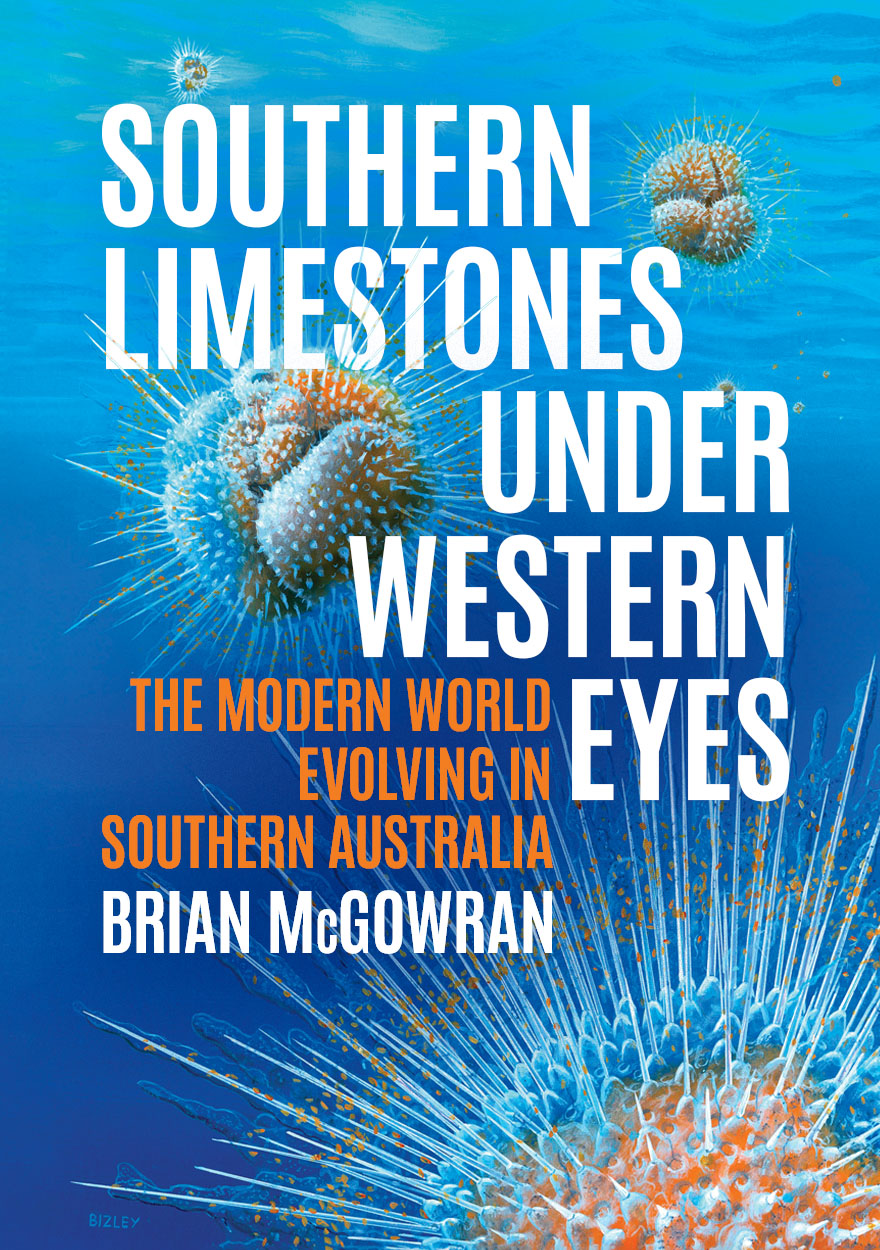
Southern Limestones under Western Eyes »
The Modern World Evolving in Southern Australia
Authored by: Brian McGowran
Publication date: September 2023
Science, the growth of reliable knowledge, became a major triumph of the European Enlightenment in the seventeenth century, under the guise of ‘natural philosophy’: investigating what the earth and universe are made of and how things work. It took another century for the parallel subject ‘natural history’ to glimpse how the earth, its geography and its richly diverse life came to be. Later, geology and biology became intertwined as biogeohistory—an ever-changing environmental theatre hosting an ever-changing evolutionary play.
This environmental theatre has shifted with the making and breaking of supercontinents, the birth and death of global oceans, and the rise and fall of global hothouses and ice ages. The evolutionary play begins with biostratigraphy, wherein fossils revealed deep time and ancient environments and built the first meaningful geological timescale, and ends with the still young science of palaeoceanography—central to which are microfossils, rich in information about the oceans and climates of the past.
In Southern Limestones under Western Eyes, Brian McGowran recounts the history of biogeohistory itself: the ever-changing perceptions of rocks, fossils and landscapes, from the late 1600s to the present. McGowran’s focus is southern Australia, the north shore of the dying Australo-Antarctic Gulf, in an era bracketed by two catastrophes: the extinction of dinosaurs and the emergence of humans.

International Review of Environmental History: Volume 9, Issue 1, 2023 »
Edited by: James Beattie
Publication date: July 2023
Inspired by recent scholarship on disaster history and situated within the broader field of environmental history, this special issue highlights structural factors that have exacerbated the effects of extreme weather and explores how states and societies have responded and adapted (or not) during and after disasters. The five case studies all focus on the Indian Ocean World (IOW), a macro-region stretching from eastern Africa to East Asia and Southeast Asia, and align chronologically with the so-called Anthropocene, the period during which the industrial Global North began to leave its indelible imprint on the world’s climatic systems. They build on a small but growing scholarship that looks at historical disasters and disaster responses within the IOW, arguing collectively for the application of historical methodologies in approaching the challenge of extreme weather now and in the future.



